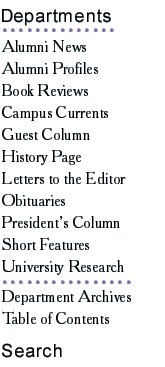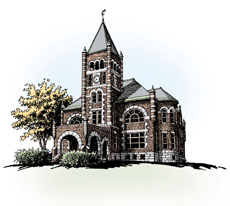

|
 Cover illustration by Byron Gin 
|

Teach Our Children Well By President Joan Leitzel
Not surprisingly, UNH prepares more New Hampshire teachers than any other institution. UNH faculty members also lead the way in introducing innovative teaching techniques, finding applications for new technology in the classroom and improving education for special-needs students and students for whom English is a second language. In addition, they have provided essential expertise in curriculum reform, developing effective assessment tools and establishing state performance standards. New Hampshire is now experiencing the teacher shortage that had been predicted at the national level for the past 15 years. In May 2001, the State Department of Education identified critical shortages in 19 professional certification areas. Nine of these are in special education; the others are in foreign languages, English as a second language, music, chemistry, physics and mathematics. New Hampshire also has a critical need for guidance counselors, media specialists and technology educators. UNH is committed to providing the K-12 teachers our schools require. But it's not enough to ensure that the number of teachers is sufficient; the quality is equally important. Together with Plymouth and Keene State Colleges and the College for Lifelong Learning, UNH is developing strategies to ensure that our schools will have not only enough teachers, but enough good teachers. The university is making a particular commitment to the preparation of science and math teachers. This area is especially important in New Hampshire, which has the second highest concentration of high-tech workers in the U.S. Even as the importance of this sector has grown, the number of degrees awarded by New Hampshire colleges in mathematics, computer science and engineering has declined, dropping by 20 percent between 1990 and 2000. Fewer than 500 four-year degrees in these areas were awarded by New Hampshire institutions in 2000. We need to double that number if we are to provide industries with the educated workforce they need. As a first step, we must increase the number of secondary school students who are prepared for university-level work in mathematics, computer science and engineering and who want to pursue careers in related fields. UNH is well positioned in those areas. Our academic programs in mathematics, science and engineering are especially strong. A year ago, the National Science Foundation awarded UNH funding to develop an Impact Center in science and mathematics education. In just its first year, the center has worked with teams of teachers from 18 school districts to strengthen curricula in science and mathematics and to develop more effective ways to teach these subjects. The university is also working with Cabletron to find ways for higher education and private industry to work together on behalf of science and mathematics education in the schools. Talented faculty members and high-quality programs cannot reach their potential on our campus without adequate facilities and equipment. In the last legislative session, the USNH trustees presented the legislature with a bold proposal for state investment in the campus facilities required for our programs in mathematics, science and engineering. This proposal had the strong support of New Hampshire business leaders and UNH alumni. In response, the legislature has committed to the largest single investment the state has ever made in University System facilities. I am delighted to see this growing emphasis on science and mathematics instruction. As a mathematician myself, I have seen the positive effects of standard-based curriculum reform in other states. I currently chair the Mathematical Sciences Education Board of the National Research Council, and I know that New Hampshire will have the support of other states as we seek solutions. Charles Reed, chancellor of the California State University System, recently observed, "We finally came to the conclusion that for our university system to be as good as we want it to be, we must help improve the K-12 system in our state." The University System of New Hampshire has come to the same conclusion. Public education in New Hampshire must not be divided into K-12 education and post-secondary education. It must be a continuum that begins in kindergarten and goes on for a lifetime. Only in this way can we guarantee the continued leadership of our state and our nation in science and technology. ~ We'd like your opinion! Visit President Leitzel's home page. Archives of the View from T-Hall columns. blog comments powered by DisqusCurrent issue | Past issues | Class notes Department archives | Send a letter/news | Address updates Advertise | About UNH Magazine | Alumni home | UNH home University of New Hampshire Alumni Association 9 Edgewood Road Durham NH 03824 (603) 862-2040 alumni@unh.edu |